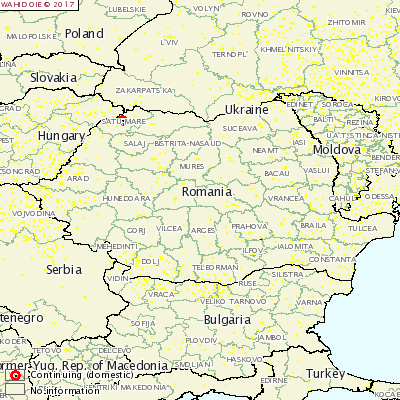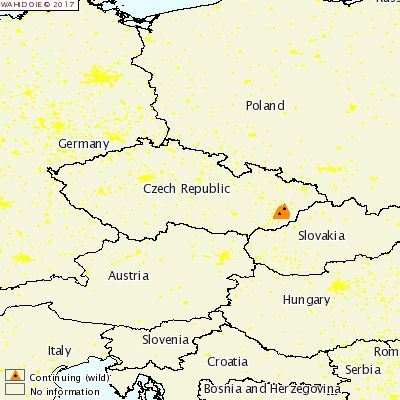African Swine Fever outbreaks in the Czech Republic and Romania
An outbreak of African Swine Fever (ASF) has been reported for the first time in the Czech Republic in Zlin Region on 27 June 2017. Despite accurate investigations, there is no evidence how the infection could have reached that area of the Czech Republic, also considering that the nearest known outbreaks of infection in Poland and Ukraine are at least 400-500 Km away. The local government office of the State Veterinary Administration has submitted a complaint against unknowns for spreading the disease, and the Minister of Agriculture, Marian Jurecka, confirmed a likely human involvement in introducing the infection in the country. Fifty wild boars in the Zlin Region were positive in PCR test for the presence of an African swine fever viral genome. It the whole country from 15/06/06 to 11/07/2017 a passive surveillance was carried out on 66 wild boars and 25 animals were positive for the disease; in the Zlin Region, Zlin district, 38 animals were examined: Příluky 5 outbreks, Hvozdná 9, Lu¸kovice 6, Kostelec u Zlína 5 outbreaks. All 25 cases of ASF in wild boars have been confirmed at the Jihlava National Veterinary Public Reference Laboratory. To date, July 26 2017, 99 wild boars were found in the Zlin region and 66 carcasses were positive for the disease; the last 15 cases occurred in the province of Zlínský (12 cases) and in the cadastral area of Kleiuvka (3 cases). Ref: (ProMed-mail post, 26 July 2017). Up to now, 609 wild boars have been caught in the hunting area authorized at three hunting associations by the Zlin Regional Veterinary Administration; 607 samples were negative and the remaining 2 samples were unsuitable for analysis. Veterinary measures on pigs and wild boars were adopted in accordance with Directive 2002/60 / EC and Regulation (EC) No 1069/2009 throughout the Zlin Region (1034 Km²) and subsequently extended throughout the country.
Both an epidemiological survey was carried out across the infected area and an accurate inspection of the sites of detection of positive animals.
Training of a workgroup with different professional figures (local veterinarians, hunters, epidemiologists, wildlife biologists) has enabled to have a clear view of the epidemiological situation and a collaborative approach to the problem in a short time. On July 25, 2017, the Hungarian Food Safety Authority (NÉBIH) warned of an ASF episode just 20 Km from the border. The outbreak was recorded at Berehuifalu, Ucraina. The agency NÉBIH has urged compliance with all the rules and regulations to prevent the spread of the virus. On 31 July 2017 an ASF outbreak was first reported to Romania in Satu-Mare, near the border with Ukraine and Hungary. One domestic pig kept in a backyard was found dead; after confirmation of the positivity at the Institute for Diagnostic and Animal Health (National laboratory) in Bucharest, the remaining three animals were killed and disposed of.The day after, a secondary outbreak in a contact farm of three domestic pigs kept in the backyard occurred; one animal was found dead and the other two were killed and disposed of. The diagnostic test used were: direct immunofluorescence (DIF), PCR and RT-PCR.The source of infection is unknown and an epidemiological investigation is ongoing.

Figure 2. First outbreak of ASF in Romania, 31 July 2017 (ref: WAHID-OIE_2017)
© IZSAM August 2017
|
|
Istituto Zooprofilattico Sperimentale
dell'Abruzzo e del Molise "G. Caporale"
Campo Boario | 64100 TERAMO | ITALIA
Telefono 0039.0861.3321 | Fax 0039.0861.332251
e-mail: archivioeprotocollo@izs.it
Posta elettronica certificata: protocollo@pec.izs.it
Partita IVA: 00060330677
Codice Fiscale: 80006470670



